The QUESTion Project fosters individuality and social responsibility in students, allowing them to question themselves, each other, and society in order to define their own purpose and direction in life. Students explore important life questions and develop the mindset and skills that will help them define the choices they make in school and life.
The QUESTion Project is founded on five Pillars of Learner Development—choice, purpose, fearlessness, interconnectedness, and a bigger picture—that students journey through to develop their overall self-knowledge. Students explore and make meaning of these pillars in the QUESTion Class, a semester- or year-long class. They engage in individual reflection, large group “co-creative” activities, small group presentations, and individual written assessments to develop a working definition of the five Pillars. It is through these activities that they share their related experiences and connect their definitions and experiences to implications for present and future decision-making. The QUESTion Class alumni showcase a positive personal, communal, and societal identity and better preparation for life after graduation.
The QUESTion Class has been adopted by 20 schools in New York City and Los Angeles, reaching more than 12,000 students. The QUESTion Project supports interested schools to implement their model through the QUESTion Academy, which provides teacher training, and ongoing coaching. The QUESTion Project Overview QUESTion Project Alumni Podcast
What Makes This Model Innovative?
Rigorous Learning
Relevance
Affirmation of Self & Others
Goals
Through the exploration of identity, agency, and purpose, the QUESTion Class addresses the whole child, going beyond teaching students skills, competencies, and attitudes. Supporting the whole child means making space for the underlying humanity that gives these skills meaning.
Authentic Identity
Students connect with, explore, and develop who they are. They develop a positive, personal conception of who they are today and who they want to be, which creates a foundation for their lives and futures.
Empowered Agency
Students develop the courage and strength to express who they are. They tackle the challenges and complexity of life and are empowered to make sense of life and their path forward.
Engaging with Purpose
Students connect who they are to others and something bigger than themselves. They are mindful of their role as members of a community and make positive and intentional contributions to their community.
Experience
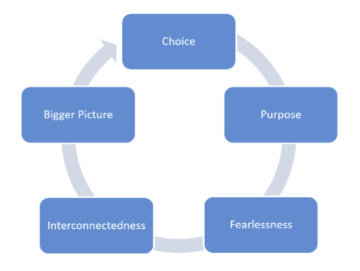 In the QUESTion Class, students tackle important life questions together. Through this, they explore each of the five Pillars—choice, purpose, fearlessness, interconnectedness, and a bigger picture.
In the QUESTion Class, students tackle important life questions together. Through this, they explore each of the five Pillars—choice, purpose, fearlessness, interconnectedness, and a bigger picture.
To ensure holistic student engagement with each of the five Pillars, units begin by first defining and developing an understanding of the Pillar from readings, videos, and other source material and through thinking critically about topics. Then students connect their intellectual grasp of the topic to relevant personal experiences through reflection in journals and other activities. Lastly, students consider the impact of the Pillar beyond themselves by engaging in discussions and other co-creative activities to expand their personal outlook and examine themselves as members of a community.
Each lesson, students explore one topic within a Pillar, through personal reflection and co-creative activities (collective reflection), and demonstrate their learnings through presentations and written assessments at the end of the unit. This structure helps students engage in the QUESTion Class framework in a way that is societally informed, practiced in community, and reflective of personal identity. Curriculum Structure Sample Lesson
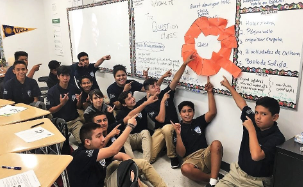 Personal reflection encompasses all the ways students engage with their own thoughts and how they understand their experience. This allows students to independently reflect on and sort through their thoughts, to be prepared to share with others. Each QUESTion Class lesson has multiple opportunities for individual reflection so students have the time and space to process their own thinking before sharing, collaborating, and co-creating. Personal reflection often takes the form of notebook exercises such as:
Personal reflection encompasses all the ways students engage with their own thoughts and how they understand their experience. This allows students to independently reflect on and sort through their thoughts, to be prepared to share with others. Each QUESTion Class lesson has multiple opportunities for individual reflection so students have the time and space to process their own thinking before sharing, collaborating, and co-creating. Personal reflection often takes the form of notebook exercises such as:
- writing—students reflect on and write a response to a provided prompt or guiding question;
- completing a graphic organizer—students organize their thoughts using charts, tables, Venn diagrams, timelines, and more.
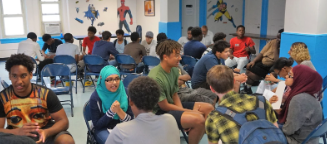 Co-creative activities, or collective reflection, provide students the opportunities to test their ideas by placing them alongside others and in turn generate deeper learning. These collaborative activities give students the ability to conceptualize their views with relevant input from source material as well as questions, support, and feedback from peers. Co-creative activities include:
Co-creative activities, or collective reflection, provide students the opportunities to test their ideas by placing them alongside others and in turn generate deeper learning. These collaborative activities give students the ability to conceptualize their views with relevant input from source material as well as questions, support, and feedback from peers. Co-creative activities include:
- discussions—guest speakers may be brought in for various topics to facilitate lively and enlightening discussions with students;
- debates—students reflect on challenging questions that often involve a central paradox, such as the question of whether life revolves around oneself or others. During a structured debate, students address these opposing viewpoints, delving into a discussion that explores both sides. Ultimately, this process leads to a nuanced understanding and an appreciation for complexity, moving beyond the oversimplified dichotomy of such questions;
- group work—students break into small groups and discuss various topics then present their thoughts to their classmates.
Written Assessment: Students complete one writing assignment at the end of each unit. The writing assignments serve both as self-exploration exercises and as assessments of students’ understanding of the five Pillars. Students are provided prompts to help them reflect on the different questions they explored, what they learned, and how they want to apply it to their lives and future. These independent written assessments can serve as a foundation for small-group presentations. Sample Writing Assignment Prompt
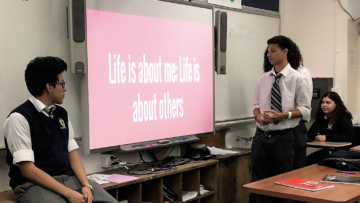 Individual or Small-Group Presentations: Students are given two to three days during each unit to prepare and share individual or small-group presentations. Students are given prompts and are free to explore the topic through various methods. This choice provides students the opportunity to practice self-direction and creative expression. Students apply their knowledge of topics learned in the class, add new angles, and expound on their experience to produce their own video presentations, posters, skits, and short talks. The presentations provide a platform for students to practice applying their learnings in a safe and collaborative environment, and an outlet to share their insights with their peers. By working in small groups, students are given the opportunity to integrate their learnings with those of others. Presentations also enable teachers to assess how well students can incorporate various perspectives, work collaboratively, and creatively express their collective understanding of the relevant content area.
Individual or Small-Group Presentations: Students are given two to three days during each unit to prepare and share individual or small-group presentations. Students are given prompts and are free to explore the topic through various methods. This choice provides students the opportunity to practice self-direction and creative expression. Students apply their knowledge of topics learned in the class, add new angles, and expound on their experience to produce their own video presentations, posters, skits, and short talks. The presentations provide a platform for students to practice applying their learnings in a safe and collaborative environment, and an outlet to share their insights with their peers. By working in small groups, students are given the opportunity to integrate their learnings with those of others. Presentations also enable teachers to assess how well students can incorporate various perspectives, work collaboratively, and creatively express their collective understanding of the relevant content area.
Supporting Structures
The QUESTion Class can be implemented in any existing school design, but it does require shifts in curriculum, adult roles, and scheduling if it is to be successful.
Schools must teach each unit in order for students to engage with each of the five Pillars.
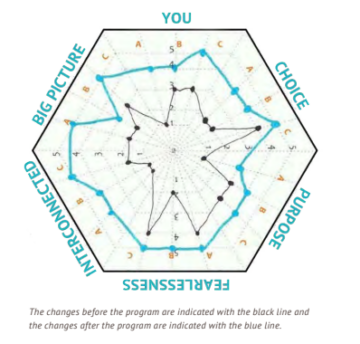 The QUESTion Class approaches exploration of its five Pillars—choice, purpose, fearlessness, interconnectedness, and a bigger picture—as a sequential journey; as such, the curriculum must be taught in order. The curriculum consists of seven total units—an introductory unit, five core units aligned to each of the five Pillars, and a closing unit—with 12 lessons in each core unit. Curriculum Structure While all units must be delivered, schools have the flexibility to choose lessons within each unit, so long as at least 36 of the 90 total lessons are delivered. The QUESTion Project staff help facilitators determine which lessons fit their class context, structure, and timeline.
The QUESTion Class approaches exploration of its five Pillars—choice, purpose, fearlessness, interconnectedness, and a bigger picture—as a sequential journey; as such, the curriculum must be taught in order. The curriculum consists of seven total units—an introductory unit, five core units aligned to each of the five Pillars, and a closing unit—with 12 lessons in each core unit. Curriculum Structure While all units must be delivered, schools have the flexibility to choose lessons within each unit, so long as at least 36 of the 90 total lessons are delivered. The QUESTion Project staff help facilitators determine which lessons fit their class context, structure, and timeline.
Each lesson has an introduction to connect students to the theme, and a combination of personal reflection and co-creative activities to create a structure for students to dive deeper into the lesson topic. The QUESTion Class’s detailed lesson plans contain everything a teacher needs to deliver the lesson, including key prompts that can be used as scripted or modified into a teacher’s own words.
Students’ understanding and their ability to authentically engage with each of the five Pillars are assessed at the end of each unit through the writing assignment and presentation. Students also complete a self-assessment matrix at the beginning and at the end of the class to chart their growth in the five Pillars and their overall self-knowledge before and after the course. Self-Assessment Matrix End-of-Class Survey
Facilitators must enroll in the QUESTion Academy for initial training, applied learning, and ongoing professional development.
Each QUESTion Class is led by an adult facilitator—a teacher or other appropriate school staff—who plays a critical role in the success of the model. The facilitator’s capacity to be themselves and invite students to be their whole selves creates an environment where all students (and adults) can share vulnerably and lead with their humanity.
All facilitators must attend the QUESTion Academy, a rigorous training that works to familiarize facilitators with the curricular structure and its foundations, and develop the nine core competencies for transformational facilitation of the QUESTion Class. The Academy begins with a four-day training before the start of the school year. It continues throughout the school year with three professional development days, bringing together QUESTion Class facilitators from various schools, and monthly coaching sessions with QUESTion Project staff.
While adults of all roles can become facilitators, the ideal QUESTion class facilitator demonstrates the following:
- commitment to student development in critical thinking and social and emotional well-being;
- capacity to be authentic with students;
- ability to empower students to shape their own learning and conclusions;
- comfort with ambiguity and self-identity as a co-questioner;
- ability to maintain an open and safe environment when behavioral issues arise.
The QUESTion Class is most successful when given priority in the schedule and when implemented with all students in a school or grade.
The QUESTion Project recommends implementing the class as a required course during the regular school day. Schools that offer the QUESTion Class as a required course for an entire grade level see the greatest long-term impact on school culture and positive individual student outcomes. However, the class can also be offered as an elective or as part of another course (e.g., health class or advisory).
The standard QUESTion Class curriculum must be implemented over a minimum 45-minute time block. The QUESTion Class is designed as a semester-long daily class, but it has also been successfully implemented for the entire year. Regardless of the length of the course, the QUESTion Class should occur a minimum of two days a week, ideally daily.
Schools must teach each unit in order for students to engage with each of the five Pillars.
 The QUESTion Class approaches exploration of its five Pillars—choice, purpose, fearlessness, interconnectedness, and a bigger picture—as a sequential journey; as such, the curriculum must be taught in order. The curriculum consists of seven total units—an introductory unit, five core units aligned to each of the five Pillars, and a closing unit—with 12 lessons in each core unit. Curriculum Structure While all units must be delivered, schools have the flexibility to choose lessons within each unit, so long as at least 36 of the 90 total lessons are delivered. The QUESTion Project staff help facilitators determine which lessons fit their class context, structure, and timeline.
The QUESTion Class approaches exploration of its five Pillars—choice, purpose, fearlessness, interconnectedness, and a bigger picture—as a sequential journey; as such, the curriculum must be taught in order. The curriculum consists of seven total units—an introductory unit, five core units aligned to each of the five Pillars, and a closing unit—with 12 lessons in each core unit. Curriculum Structure While all units must be delivered, schools have the flexibility to choose lessons within each unit, so long as at least 36 of the 90 total lessons are delivered. The QUESTion Project staff help facilitators determine which lessons fit their class context, structure, and timeline.
Each lesson has an introduction to connect students to the theme, and a combination of personal reflection and co-creative activities to create a structure for students to dive deeper into the lesson topic. The QUESTion Class’s detailed lesson plans contain everything a teacher needs to deliver the lesson, including key prompts that can be used as scripted or modified into a teacher’s own words.
Students’ understanding and their ability to authentically engage with each of the five Pillars are assessed at the end of each unit through the writing assignment and presentation. Students also complete a self-assessment matrix at the beginning and at the end of the class to chart their growth in the five Pillars and their overall self-knowledge before and after the course. Self-Assessment Matrix End-of-Class Survey
Facilitators must enroll in the QUESTion Academy for initial training, applied learning, and ongoing professional development.
Each QUESTion Class is led by an adult facilitator—a teacher or other appropriate school staff—who plays a critical role in the success of the model. The facilitator’s capacity to be themselves and invite students to be their whole selves creates an environment where all students (and adults) can share vulnerably and lead with their humanity.
All facilitators must attend the QUESTion Academy, a rigorous training that works to familiarize facilitators with the curricular structure and its foundations, and develop the nine core competencies for transformational facilitation of the QUESTion Class. The Academy begins with a four-day training before the start of the school year. It continues throughout the school year with three professional development days, bringing together QUESTion Class facilitators from various schools, and monthly coaching sessions with QUESTion Project staff.
While adults of all roles can become facilitators, the ideal QUESTion class facilitator demonstrates the following:
- commitment to student development in critical thinking and social and emotional well-being;
- capacity to be authentic with students;
- ability to empower students to shape their own learning and conclusions;
- comfort with ambiguity and self-identity as a co-questioner;
- ability to maintain an open and safe environment when behavioral issues arise.
The QUESTion Class is most successful when given priority in the schedule and when implemented with all students in a school or grade.
The QUESTion Project recommends implementing the class as a required course during the regular school day. Schools that offer the QUESTion Class as a required course for an entire grade level see the greatest long-term impact on school culture and positive individual student outcomes. However, the class can also be offered as an elective or as part of another course (e.g., health class or advisory).
The standard QUESTion Class curriculum must be implemented over a minimum 45-minute time block. The QUESTion Class is designed as a semester-long daily class, but it has also been successfully implemented for the entire year. Regardless of the length of the course, the QUESTion Class should occur a minimum of two days a week, ideally daily.
Supports Offered
The QUESTion Project offers the following supports to help you implement its approach.
School Partnership
Cost Associated
Partnership allows for customizable, curated support, aimed at meeting the specific needs of your school community, to ensure the success of the program in your school’s specific context. This includes:
- The QUESTion Curriculum & Class: a semester- or year-long, credit-bearing course suitable for students in grades 9–12
- The Question Academy: a comprehensive body of teacher training, professional development, and individualized coaching
- College QUEST: a program that enhances a student’s search for college through a social-emotional lens
- Leadership & Ambassador Programs: programs that empower students to become change-makers in their school community
- The QUESTion Day: a school-wide event that builds and strengthens the entire community.
Reach
Impact
A qualitative study by Stanford University Center for Adolescence, which interviewed recent alumni of the QUESTion Class, found positive shifts across multiple dimensions. Stanford Impact Study Summary Of the students interviewed, the study revealed:
- 83% developed a “beyond-the-self” orientation
- 94% expressed a greater sense of courage, vulnerability, and trust
- 94% expressed a greater sense of openness and perspective
- 100% expressed greater personal autonomy and agency.
Further, 95% of students recorded a positive shift in the five Pillars—choice, purpose, fearlessness, interconnectedness, and sense of a bigger picture—on the Self-Assessment Matrix after the first year of implementation.
“This class is a beacon of light for those who may live in fear, doubt, and trouble. There are a lot of people like me who question the world. The common questions I hear are, ‘Why am I here?’, ‘What am I going to do with my life?’, ‘Why shouldn’t I just give up.’ Because of the introduction of the QUESTion Class at my school, my perspective on life changed…and this has helped me as an individual to extend my character into somebody better. This class will be important to many others who were like me at one point, or who are struggling to find out who they are as individuals, and are struggling to find a sense of purpose in life.”—Brandon Moreno, Student, Bronx Center for Science and Mathematics
“The QUESTion Project enhances an individual’s awareness beyond their own ailments and personal life complications. It enables teenage students to recognize that their dilemmas, whether they’re philosophical and existential, or academic and social, make them interconnected in one form or another to each other. Thus, this attained clarity comes bearing the fruits of empathy and compassion in a trusting society in which we are taught not only technical fundamentals but concepts that enhance our character and allow us to embrace the boundlessness of our minds.”—Britney Kiki, Student, Harlem Renaissance High School
Testimonials from teachers and school leaders report transformation in students and schools as a result of implementing the QUESTion Class. The QUESTion Project: Our Results
“It was the kids who won me over because the students were the ones that I saw break out of a shell that I didn’t even know was there; blossom into someone that was underneath these layers and they were able to have a voice. Most of the students stated that not only were they able to have a voice but they heard their voices in other students as well and that was so genuine to me.”—Ms. Hudson, Health Teacher, Bronx High School for Law & Community Service Ms. Hudson’s Experience
“The curriculum and the teacher training have reinvented our school without making major structural changes.”—Michael Barakat, Principal, Bronx High School of Law and Community Service Principal Barakat’s Experience



